Article 50: Coffee in Jewish dignity
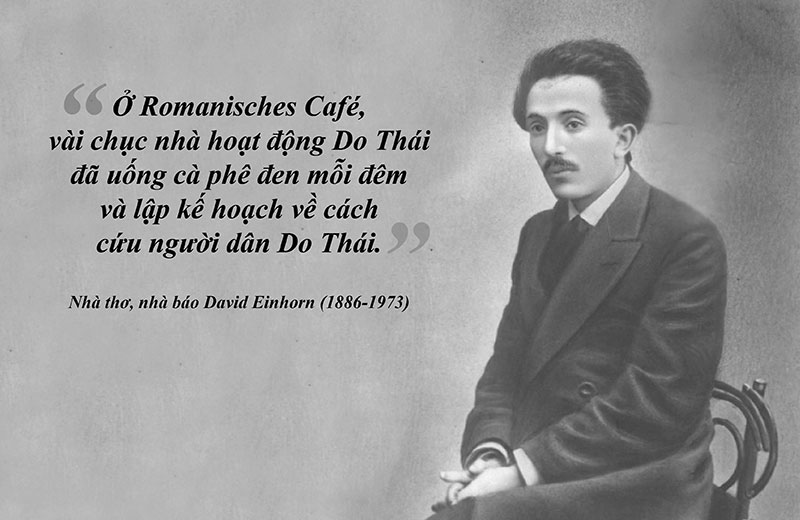
“At Romanisches Café, several dozen Jewish activists drank black coffee every night and made plans on how to save the Jewish people.” Poet and journalist David Einhorn (1886-1973)
Coffee shops have never been a Jewish own space, but coffee shops have had a profound influence on the creation of modern Jewish character.
Coffee shop – where people can be themselves
Since Muslims used coffee in Dhikr ceremonies, Jews have also recognized the drink’s power to wake the mind and accept coffee as a traditional drink. They enjoy coffee in Kosher cuisine, Shabbathay Mass to kick off the midnight ritual Tikun Hatzot.
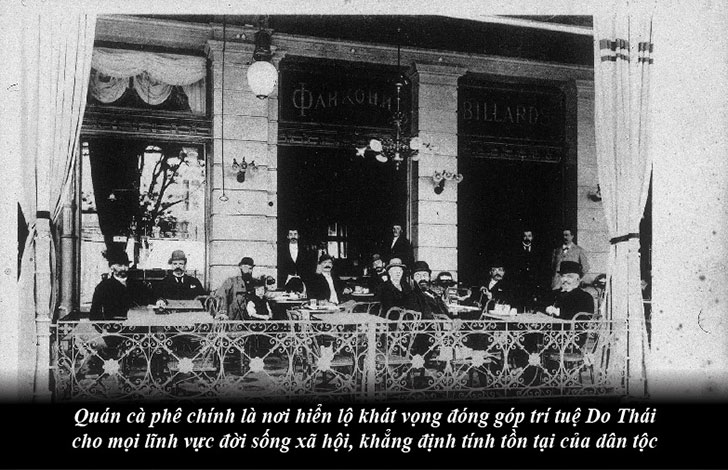
The coffee shop is the place to manifest the desire to contribute Jewish wisdom to all areas of social life, affirming the existence of the people.
From the 8th to 16th centuries, Jewish migration created small communities throughout the Ottoman Empire and Eurasia. However, regardless of where they lived, the Jewish community was separated by its own culture, language and way of life. Because of their intense sense of national-religious identity, the Jews were always isolated. Only in the cafe space – which accepts all ideas, welcomes all walks of life, classes, ethnicities… Jews felt that they could participate in social life with other ethnic groups.
Jews came to cafes not just for the drink – they could enjoy it at home, what drew Jews to the cafe was precisely the inner workings of this academic space. Jews are a people that respect knowledge and consider intellectual knowledge to be the most valuable asset of human beings. Many literary, artistic, and scientific movements formed from coffee shops, and Jews came to coffee shops to approach and search for people with the same school of thought. They learned from other religious peoples and broadened their outlook on life and the world. They were also allowed to share knowledge with others in a respectful manner.
From the nature of equal debate, the Jews also expected the indigenous society to understand and accept their cultural identity. Affirming that the Jews were a different people but could still exist in harmony and moreover, they would also contribute many human values to the community. In the cafe, the Jews shared their research to express their desire to prove existence.
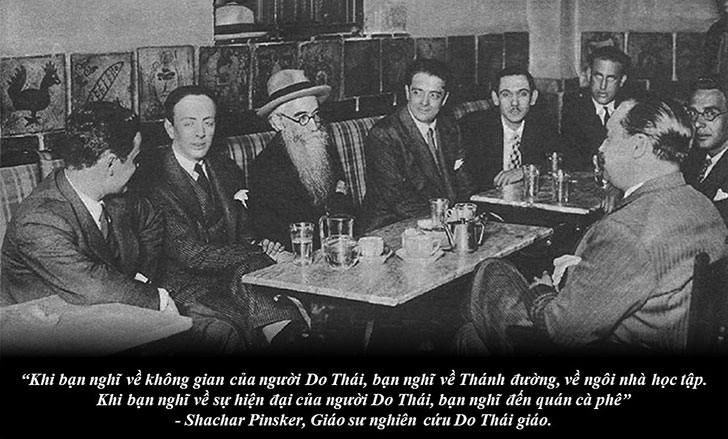
“When you think about Jewish spaces, you think about the Synagogue, you think about house of study. When you think about Jewish modernity, you think about the coffee house.” – Shachar Pinsker, Professor of Judaism
Moses Mendelssohn, considered the father of the Jewish Enlightenment, wrote essays and foundational books on Haskalah (lit. Intellect) philosophy at the Gelehrtes Kaffeehaus (Germany). Yonatan Ratosh – founder of the Canaanite movement shared his views at Bitan Café (Israel), Ziemiańska Cafe (Poland) was where the Jewish Writers’ Association discussed and propagated works in Yiddish and Hebrew. Kassit Café (Israel) published works of Jewish literary masters in the weekly Davar newspaper. Herrick’s Café was an important gathering place for Jewish writers and journalists living in New York (USA).
The intellectual scholars Stefan Zweig, Alfred Adler, Theodore Herzl, Sholem Aleichem, Isaac Bashevis… also spent most of their lives in the cafes of Berlin, Vienna, Budapest, Prague creating highly influential works to the mass culture. In the cafe, activities took place in a socialized way, a space of open discussion about all issues of the times, open to everyone. So the Jews viewed the coffee shop as a free school or a social school.
The space that defined the modern Jew
At the end of the 19th century, the cafe became the place that made the contemporary history of the Jewish people. The turning point in the journey of 4,000 years of wandering was the emergence of Zionism. Zionism held that the completion of national revival should be achieved by promoting Jewish identity.
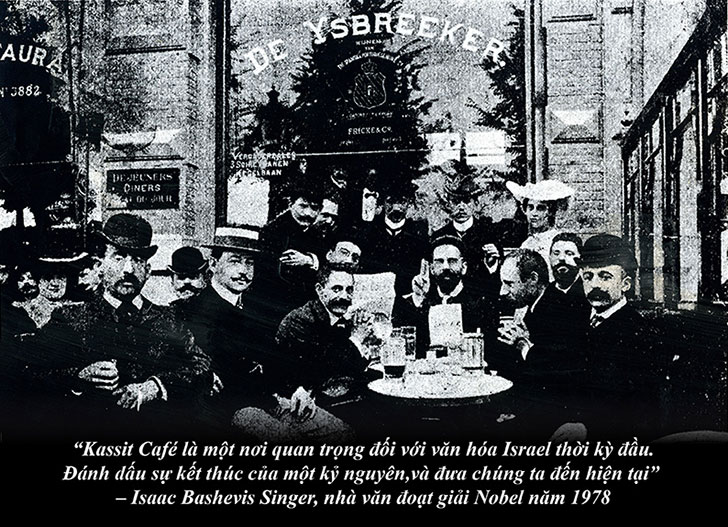
“Kassit Café was an important place for early Israeli culture. It marks the end of an era, and brings us to the present.” Isaac Bashevis Singer, 1987 Nobel Prize-winning writer
Initially, Jewish intellectuals gathered in Jewish-founded cafes such as Sheleg Levanon Café, Hermon Café, and Kassit Café in Tel Aviv (Israel) in an effort to foster modern Jewish national character. The activities in the coffee shop spread to become a wave of “returning to the origin” of Jews on all continents. Monopol Café and Romanisches Café in Berlin were known to be the center of Zionism in Germany. The Rehavia Café, Hermon Café, Atara Café and especially the Tmol Shilshom Café in Jerusalem were considered forums for Zionist leaders. Theodor Herzl – “Spiritual Father of the Jewish State” united like-minded people in a cafe in Vienna (Austria) and published the weekly Die Welt as the main discourse of Zionism in the same cafe.
Modern Jewish culture was shaped through theoretical lectures, literary and artistic works published or performed in cafes. Propaganda newspapers of Zionism such as Ha-Tsefirah, Ha-Tsofeh, Ha-Olam… were published in coffee shops. The plays of Jacob Gordin, Peretz Hirschbein and Max Reinhardt performed at the Theater Café and Monopol Café (Berlin) partly made modern Jewish culture clear and Zionist aspirations more explosive.
From the 20th century and mainly into the 1930s, Tel Aviv’s coffee shops were considered mythological sites that left a deep mark on Jewish history. Tel Aviv received a wave of Jewish immigrants to Israel and the city played a large role during the Zionist process. Business people shared economic problems at Haachim Café, Carlton Café, writers met at Kassit Café, MediaWiki Café and Maor Café, art circles looked to Sheleg Levanon Café… The appearance of Jewish identity was gradually taking shape in Tel Aviv from architecture, music, education, culture, lifestyle… Tel Aviv developed as the Yishuv cultural center (Jewish community wishing to revive their nation) and attracted Jews around the world to return. On May 14, 1948, in Tel Aviv, the State of Israel was proclaimed after 4,000 years of wandering.
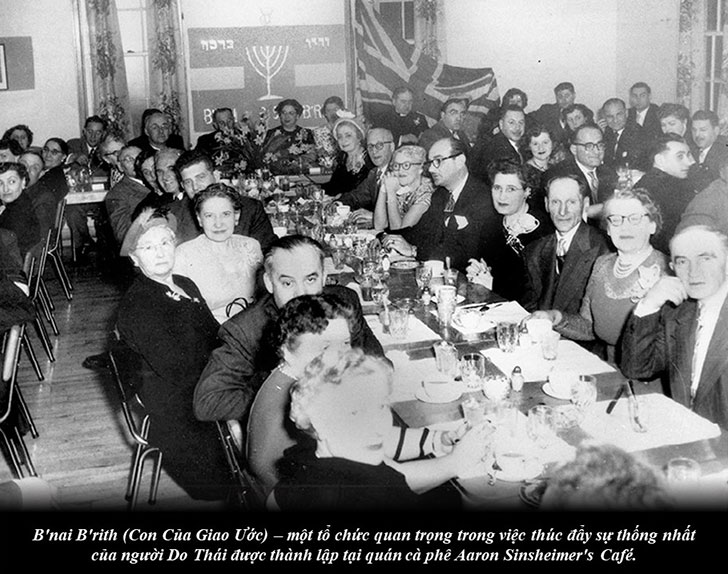
B’nai B’rith (lit. Children of the Covenant) – An important organization in promoting Jewish unity was founded at Aaron Sinsheimer’s Café
Because of its awakening property, the Jews accepted coffee from the Muslim world as a beverage used in traditional national ceremonies. Because of the spirit of freedom and intellectual enlightenment, Jews considered coffee shops to be a relic space of community memory. Because, from the gathering around the cafe, the Jews really questioned the identity of their own people. Going to the coffee shop to seek fair integration into many areas, expressing the desire to contribute Jewish wisdom to all areas of local social life, towards the desire to affirm the existence of the nation. And on the journey of national restoration, coffee shops were an important factor identifying the modern Jewish national culture and qualities – a necessity for the Jews to return to their homeland and become a real nation.
View more: https://bit.ly/caphetrietdao
THE REAL COFFEE
ROASTED ONLY FOR PEOPLE OF WISDOM!
Source: “The Philosophical Way of Coffee” – copyright by Trung Nguyen Legend


